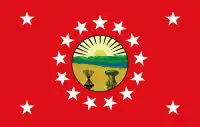Edward Tiffin
Edward Tiffin (June 19, 1766 – August 9, 1829) was an American politician from Ohio. A member of the Democratic-Republican party, he served as the first governor of Ohio and later as a United States Senator.
No man who has occupied the gubernatorial chair of Ohio has possessed a greater genius for the administration of public affairs than Edward Tiffin, its first governor. He appeared upon the scene of action in the Northwest Territory in its creative period, when the work of moulding the destinies of a future commonwealth was committed to the care of a very few men. Head and shoulders above them all stood Edward Tiffin. His official life displayed a better general average of statesmanship than that of any of his successors. ... His work in advancing and developing Ohio has not been equalled by any man in its history.
Edward Tiffin | |
|---|---|
 | |
| 4th Surveyor General of the Northwest Territory | |
| In office 1815 – August 9, 1829 | |
| Preceded by | Josiah Meigs |
| Succeeded by | William Lytle II |
| 1st Commissioner of the General Land Office | |
| In office May 7, 1812 – October 11, 1814 | |
| Preceded by | Inaugural Holder |
| Succeeded by | Josiah Meigs |
| 8th Speaker of the Ohio House of Representatives | |
| In office December 4, 1809 – December 1, 1811 | |
| Preceded by | Alexander Campbell |
| Succeeded by | Matthias Corwin |
| United States Senator from Ohio | |
| In office March 4, 1807 – March 3, 1809 | |
| Preceded by | Thomas Worthington |
| Succeeded by | Stanley Griswold |
| 1st Governor of Ohio | |
| In office March 3, 1803 – March 4, 1807 | |
| Preceded by | Charles Willing Byrd (as Governor of Northwest Territory) |
| Succeeded by | Thomas Kirker |
| 1st Speaker of the Northwest Territory House of Representatives | |
| In office September 16, 1799 – January 23, 1802 | |
| Preceded by | Inaugural holder |
| Succeeded by | Michael Baldwin (as Speaker of the Ohio House of Representatives) |
| Personal details | |
| Born | June 19, 1766 Carlisle, Cumberland, England |
| Died | August 9, 1829 (aged 63) Chillicothe, Ohio, U.S. |
| Resting place | Grandview Cemetery Chillicothe, Ohio |
| Political party | Democratic-Republican |
| Spouse | Mary Worthington |
| Signature |  |
Biography
Sources indicate that he was born in Carlisle;[2] however he may have been born in or near Workington[3] — also in the then county of Cumberland, England. Tiffin attended the Latin school in Carlisle, and became an apprentice to a student of medicine in 1778. Six years later he completed his apprenticeship.[2] His family emigrated to Virginia in 1783,[4] and he began practicing medicine at the age of seventeen.[2]
In 1789, he married Mary Worthington of Berkeley County, sister of future Governor of Ohio Thomas Worthington. She died, childless, in 1808. A year after their marriage, the Tiffins joined the Methodist church after hearing the preaching of Thomas Scott, who would be their neighbor and friend for many years.[5] Bishop Asbury ordained Tiffin a deacon of the Methodist church November 19, 1792, authorizing him to preach.[6] Tiffin and Worthington inherited sixteen slaves when Worthington's father died. They each decided to manumit their slaves and move to the Northwest Territory, where slavery was outlawed.[7] Tiffin headed westward, along with Thomas Worthington, in 1798, settling in Chillicothe, Ohio.
Northwest Territory
Tiffin became the first doctor in Chillicothe, traveling on horseback, day and night, to treat the afflicted.[8] He arrived with a letter addressed to the governor of the Northwest Territory, Arthur St. Clair from George Washington, recommending him for public office. Tiffin served as the Speaker of the Territorial House of Representatives from 1799 to 1801 and as president of the 1802 Constitutional Convention,[9] where he cast a tie-breaking vote to deny the voting franchise to the new state's 337 African American residents.[10] He was a leader of the Chillicothe Junto, a group of Chillicothe Democratic-Republican politicians who brought about the admission of Ohio as a state in 1803 and largely controlled its politics for some years thereafter. Among his colleagues in the faction were Thomas Worthington and Nathaniel Massie.
Tiffin was the obvious choice for the governorship when Ohio was admitted to the Union. He was elected almost without opposition to a first term and re-elected by similarly overwhelming numbers two years later. Tiffin acted promptly to stop the Burr conspiracy in his second term.[11]
Tiffin was elected to the U.S. Senate in 1806 and resigned the governorship in March 1807 to take his seat. He served only two years, however, resigning after the death of his wife. "He was ever faithful to the interests of the West and diligent in seeking the welfare of its inhabitants. He procured an appropriation of public money for the improvement of the Ohio River. He secured better and speedier transportation of the mails; a better and more rapid system for the surveys of western lands; and urged such modifications of the laws regarding sales of western land as would, to use his own words, 'guard the purchasers of them from unnecessary embarrassments and frequent ruin.' "[12] He also voted for the expulsion of the other Ohio Senator, John Smith, who had been implicated in the Burr Conspiracy.[13] He spent only a few months at home, however, before being elected to the Ohio House of Representatives, where he served as speaker from 1809 to 1811. Tiffin remarried April 16, 1809, to Mary Porter, originally from Delaware, and then of Ross County.[14] Tiffin became the first commissioner of the General Land Office, which managed allocations of Federal lands.
He quickly helped remove the Federal records from Washington before it was sacked during the War of 1812.[15] In 1814, he became the Surveyor General of the Northwest Territory, exchanging positions with Josiah Meigs so that he might spend more time near his home in Chillicothe. Tiffin served in the post until his death.
Death
Tiffin was buried in Grandview Cemetery, Chillicothe, Ross County, Ohio. His death was reported in the newspapers, such as this notice in the Brattleboro Messenger (Brattleboro, VT), Sep. 18, 1829, p. 3: At Chillicothe, Doct. Edward Tiffin, formerly Governor of Ohio, and late Surveyor General of the United States, aged 64 years.
See also
Notes
- Ryan, Daniel J (1888). "Edward Tiffin". A History of Ohio with Biographical Sketches of her Governors and the Ordinance of 1787. Columbus, Ohio: A H Smythe. pp. 167–170.
- "Edward Tiffin". Ohio Historical Society. Archived from the original on May 13, 2012. Retrieved July 11, 2012.
- "Ancestors of James Monroe Tiffin". Ancestry.com. Archived from the original on 2014-10-17. Retrieved 2012-11-07.
- "Ancestors of James Monroe Tiffin". Ancestry.com. Archived from the original on October 17, 2014. Retrieved July 11, 2012.
- Gilmore 1897 : 4
- Gilmore 1897 : 5
- Gilmore 1897 : 6
- Gilmore 1897 : 11
- Ryan, Daniel Joseph (1896). "First Constitutional Convention, Convened November 1, 1802". Ohio Archaeological and Historical Publications. V: 131–132.
- "Black, White & Beyond: Multiculturalism in Greater Akron, An Interactive History". learn.uakron.edu. Archived from the original on 1 November 2020. Retrieved 29 October 2020.
- Gilmore 1897 : 99-102
- Gilmore 1897 : 108
- Gilmore 1897 : 116
- Gilmore 1897 : 119
- Gilmore 1897 : 127-128
- Goodman, Rebecca (2005). This Day in Ohio History. Emmis Books. p. 243. ISBN 9781578601912. Retrieved 21 November 2013.
References
- Gilmore, William Edward (1897). Life of Edward Tiffin, first governor of Ohio. Chillicothe, Ohio: Horney and Sons.
External links
- United States Congress. "Edward Tiffin (id: T000268)". Biographical Directory of the United States Congress.
- "Edward Tiffin". Ohio Memory.



